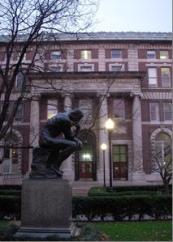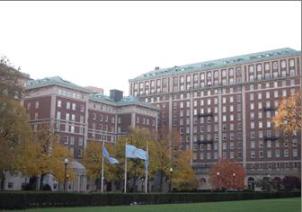2011年11月 月次レポート(楊殿閣 アメリカ)
Location: Columbia University
Time: November, 2011
Name: Denka Yanagi
ITP Monthly Report
The phrase "Occupy Wall Street" is now occupying the everyday news headline in New York. In this month, I also have come to understand "Occupy Washington DC" and "Occupy Columbia". What has made me think that being a Visiting Scholar at Columbia now is the best time and the best place to analyze global issues are not only these news phrases and participants at demonstrations but also the fascinating faculty and classmates here.  The wide framework of my research is education development in developing countries. But to think about developing countries, we automatically need to think about globalization or the relationship between developed and developing countries today. Thus, it is important to review what the discourse of "development" is, and how various contemporary thinkers conceptualize the promise and problems of international development. During these couple of weeks, I have had the chance to compare some Nobel Prize winning authors and others of the same caliber in a class. These authors were Amartya Sen Development as Freedom (2000);Peter Uvin Human Rights and Development (2004); Willam Easterly The White Man's Burden (2007); Jeffery Sachs The End of Poverty (2005); Joseph Stiglitz The Stiglitz Report (2010); and Dambisa Moyo Moyo Dead Aid (2009) (Jeffery Sachs and Joseph Stiglitz are the Columbia Faculty).
The wide framework of my research is education development in developing countries. But to think about developing countries, we automatically need to think about globalization or the relationship between developed and developing countries today. Thus, it is important to review what the discourse of "development" is, and how various contemporary thinkers conceptualize the promise and problems of international development. During these couple of weeks, I have had the chance to compare some Nobel Prize winning authors and others of the same caliber in a class. These authors were Amartya Sen Development as Freedom (2000);Peter Uvin Human Rights and Development (2004); Willam Easterly The White Man's Burden (2007); Jeffery Sachs The End of Poverty (2005); Joseph Stiglitz The Stiglitz Report (2010); and Dambisa Moyo Moyo Dead Aid (2009) (Jeffery Sachs and Joseph Stiglitz are the Columbia Faculty).
Through observing several different logical and philosophical ideas, I have been able to deepen my understanding of the complex picture of international aid and international development. The notion of "development" is not a simple revelation of a universal structure. It rather provides the tools for donors to pursue their projects. It is important, in applying for international education development from an academic standpoint, to recognize that the contradiction between commitment to the moral logic of "development", and cynicism towards "development" has to be addressed head-on.
Another important point, aside from theories of these thinkers such as I have described above, I am figuring out beyond the language¬: "development". That is the concept of "development" itself is always constructed by the Western or outside of local, and the developing side or the local is just an objective of developers. Considering this system of relations, it can link to earlier critiques of Foucault's binary structures of power and knowledge. I am very happy to have a chance to attend the course, and participate in the debate with people at Columbia.

